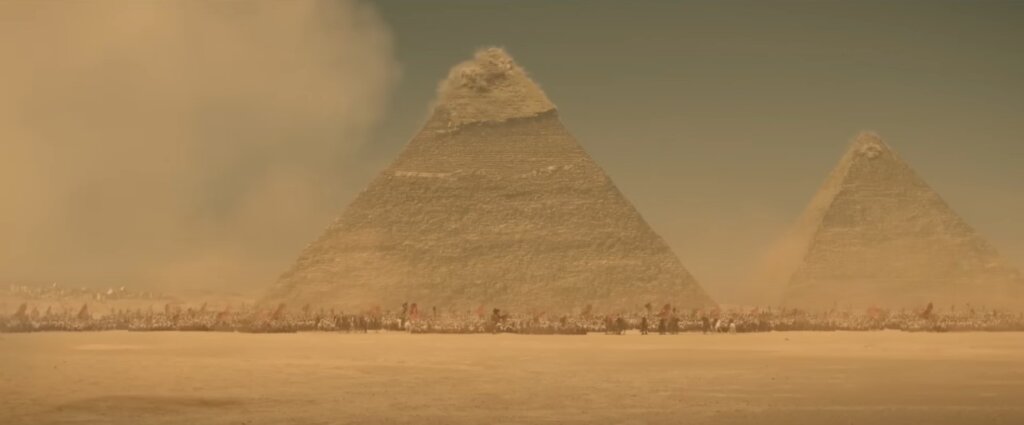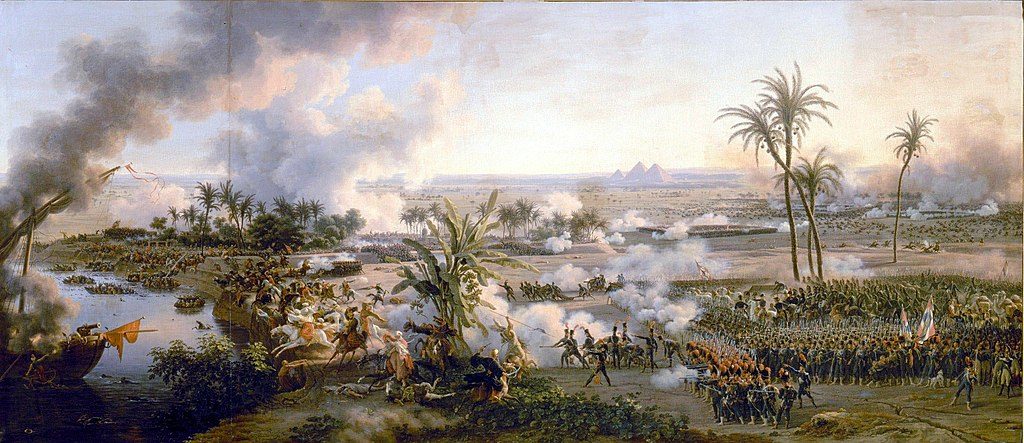The Battle of the Pyramids
It’s till summer, so here’s a short post to allow you the maximum possible time out in the sun.
Today (21 July) is the anniversary of the Battle of the Pyramids, which gave Napoleon control of Egypt. It features in the upcoming Ridley Scott film, Napoleon, and you can see it in the trailer. Here’s a screenshot:

It looks great, doesn’t it?
Sadly, the reality didn’t feature the pyramids nearly so prominently. Napoleon understood PR in an astonishingly modern way. He wanted the French public to celebrate his glorious victory and announcing that he had won a battle at Embabeh wasn’t going to have nearly the impact of his saying he had won the Battle of the Pyramids. Here, in an 1808 painting by Louis-François, is a more realistic representation.

You can see the pyramids on the horizon, but it’s hardly the way Ridley Scott has presented it.
The battle was fought against the Mameluke army that held Egypt on behalf of the Turks. (That’s a very simplified summary of the situation but more than enough for now and, I suspect, more than you’re going to get from Ridley Scott.) The Mamelukes were regarded as fine soldiers but had never really faced a disciplined European army like the French. The Battle of the Pyramids turned into a rout and ended up little short of a massacre with the Mameluke army trying to escape across the Nile towards Cairo. Here’s a description of the end of the battle from my book, Burke and the Bedouin.
Some managed to escape to the south before the French army swung round far enough to close off that possibility. Most, though, forced to choose between yet another futile charge on the French lines and diving into the river, chose the latter.
Brilliant horsemen as they were, few were able to swim their mounts even to the half-way point, and Burke watched in horror as the cream of the Mameluke Army perished in the Nile. They were joined in their doomed flight by the infantry who had been left in the camp. With the French pouring over the ramparts, they saw their only chance of survival to be flight by water. Although there were boats moored ready, the sheer number of terrified men leaping abort them led several to sink. Fire from the French crippled many others. In the chaos and confusion, boats collided and rammed into the shore, often drowning not only men on board but others who had been desperately trying to swim clear. A few craft eventually pulled out into the stream out of range of French fire but most of the men who took to the water died there.
Through his telescope, Burke saw a reserve force which had been positioned between Cairo and the Nile. They should have offered some final resistance to the victorious invaders. Their commanders, though, had obviously watched the disaster and drawn from it the same conclusion as he had. There was nothing now that could stop the French army. The forces across the river turned and fled away from the city. Now, on both sides of the Nile, dust billowed into the air to the south as the remains of a once mighty army ran for the safety of the desert lands of Upper Egypt.

BURKE AND THE BEDOUIN
Burke’s mission to watch out for French plots in Egypt is overtaken by events when Napoleon invades the country. On one side: a French army, 35,000 strong. On the other: James Burke and Bernadita, the Spanish woman he has saved from captivity in Cairo.
From the Battle of the Pyramids to Nelson’s victory on the Nile, James Burke’s adventures in Egypt find him at the eye of a desert storm. Can he frustrate French plans and get Bernadita safely out of country? And are the pigeons he had to carry to Alexandria going to be any help at all?
James Burke’s second adventure is set against the background of one of Napoleon’s less well-known campaigns.
It’s real history – but not the stuff you learned at school.
